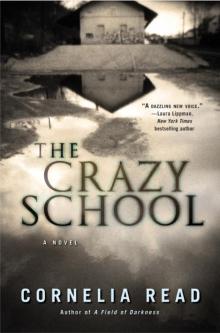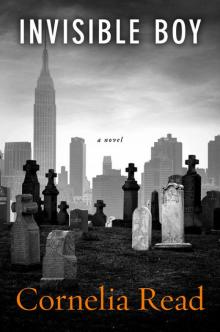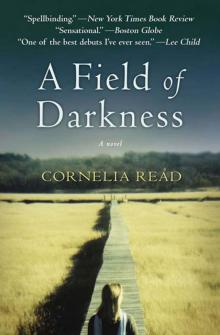- Home
- Cornelia Read
Invisible Boy
Invisible Boy Read online
Also by Cornelia Read
A Field of Darkness
The Crazy School
Copyright
This book is a work of fiction. Names, characters, places, and incidents are the product of the author’s imagination or are used fictitiously. Any resemblance to actual events, locales, or persons, living or dead, is coincidental.
Excerpted on page 411: “Natural Music.” Poem by Robinson Jeffers. The Collected Poetry of Robinson Jeffers, Volume 1, edited by Tim Hunt. Copyright © 1938, renewed 1966 by Garth and Donnan Jeffers. All rights reserved. Used with permission of Stanford University Press, www.sup.org.
Copyright © 2010 by Cornelia Read
All rights reserved. Except as permitted under the U.S. Copyright Act of 1976, no part of this publication may be reproduced, distributed, or transmitted in any form or by any means, or stored in a database or retrieval system, without the prior written permission of the publisher.
Grand Central Publishing
Hachette Book Group
237 Park Avenue
New York, NY 10017
Visit our website at www.HachetteBookGroup.com
www.twitter.com/grandcentralpub
Grand Central Publishing is a division of Hachette Book Group, Inc.
The Grand Central Publishing name and logo is a trademark of Hachette Book Group, Inc.
First eBook Edition: March 2010
ISBN: 978-0-446-55203-5
Contents
Copyright
MANHATTAN
Chapter 1
Chapter 2
Chapter 3
Chapter 4
Chapter 5
Chapter 6
Chapter 7
Chapter 8
Chapter 9
Chapter 10
Chapter 11
Chapter 12
Chapter 13
Chapter 14
Chapter 15
Chapter 16
Chapter 17
Chapter 18
Chapter 19
Chapter 20
Chapter 21
Chapter 22
Chapter 23
Chapter 24
Chapter 25
Chapter 26
Chapter 27
Chapter 28
Chapter 29
Chapter 30
Chapter 31
Chapter 32
Chapter 33
Chapter 34
Chapter 35
Chapter 36
Chapter 37
Chapter 38
Chapter 39
Chapter 40
Chapter 41
MANHATTAN
Chapter 42
Chapter 43
Chapter 44
Chapter 45
Chapter 46
Chapter 47
Chapter 48
Chapter 49
Chapter 50
Chapter 51
Chapter 52
Chapter 53
Chapter 54
Chapter 55
Chapter 56
Chapter 57
Chapter 58
Chapter 59
Chapter 60
Chapter 61
Chapter 62
Chapter 63
Chapter 64
NORTHEAST HARBOR, MAINE
Chapter 65
Chapter 66
SUMMER 1978
Chapter 67
Acknowledgments
To my cousin, Cate Ludlam,
and my cousin-in-spirit, Eric Rosenbaum
This project was supported in part by an award from
the National Endowment for the Arts.
I looked on my right hand, and beheld, but there was no man that would know me: refuge failed me; no man cared for my soul.
—Psalm 142
MANHATTAN
September 1990
1
So here’s what I love about New York City: if someone acts like a dumb asshole and you call them on acting like a dumb asshole, the bystanders are happy about it.
Anywhere else I’ve ever lived they just think I’m a bitch.
Also, in Manhattan the Chinese food is excellent and they deliver, which to me counts as pretty much the acme of human achievement, to date. Especially with free cold sesame noodles.
I’m sorry, but if you pick up your phone and all you can get them to bring you for sustenance is crappy lukewarm national-chain pizza, you do not live in civilization.
Having just spent four years out in what is euphemistically known as “the heartland,” I was overjoyed to be back in the city of my birth.
It was an early fall day and totally gorgeous out, and my mother and I were walking down lower Sixth Avenue. We were supposed to be picking up a cake for a party that night, and I was in a most excellent mood.
Mom looked like she’d rather be weeding something or moving piles of rocks around or one of those other kinds of strenuous activities one gets up to out in the country.
“Must be this one,” she said, pointing toward a slightly ratty bakery on the opposite side of the street from us, just above Waverly Place.
We sprinted across Sixth against the light, Mom leading the way. She hadn’t actually lived in Manhattan since 1965, but some habits die hard.
There was this brittle-looking skinny faux-blonde chick standing next to the bakery’s door. Her makeup was kabuki/stewardess, and she teetered atop painfully chic Bergdorf-bitch slingbacks.
I wondered anew why some women were so desperate to wear “fuck-me” shoes. I have long preferred “fuck- you shoes.”
Faux-blonde chick pulled the door open but then just stood there, like she was appalled to realize she might for once actually ingest something besides diuretics and a half-stalk of celery.
Mom, meanwhile, ran a hand through her own short, dark hair and breezed in past her.
Stunned at this effrontery, the woman sniped, “So what am I now, a doorman?”
Oh for chrissake, lady, get the hell over yourself.
As she was still just standing there, I muttered, “What, you got some problem with doormen?” and strode on inside myself.
The bakery’s interior was dark compared to the sidewalk’s mellow late-summer bloom of light. It took a few seconds for my eyes to adjust, so I just sucked in the scents of butter and vanilla perfuming the small establishment.
Mom asked about our party cake up at the display counter while a gang of confectionary aficionados sampled tortes and bombes and éclairs at a dozen tiny tables crowded together along the black-and-white-tiled floor.
Just as the proprietress set a pink box on the countertop in front of my mother, I felt a set of Flintstones-pterodactyl claws latch on to my shoulder.
The now-even-more-pissed-off door-lady yanked me around to shriek, “You bitch!” right in my face—so close I got nailed with a constellation of spit flecks.
“Um,” I said, trying to back off a little, “I beg your pardon?”
She gripped my shoulder harder and started jabbing me in the chest with a bony finger. “Who. The. Hell.” Poke. Poke. Poke. “Do you think you are?”
The final poke practically broke her french-manicured nail off, right in the middle of the LEFTY’S TATTOO AND PIERCING, CHULA VISTA logo on my best secondhand black T-shirt.
“I think I’m Madeline Ludlam Fabyan Dare,” I said, raising my chin to look down my nose at her. “Why?”
“Bitch!” spat my scrawny nemesis, redundantly.
All the people at the little tables were watching now, pastry-loaded forks paused in midair.
Aware of our audience, psycho-babe dropped her hands from my person and just stood there, fists clenched, vibrating like an irate tuning fork.
“Oh, please,” I said. “Like it’s the end of the fucking world
if you held the door for someone?”
Her right hand came back up, finger extended. “You!” Poke. “Need!” Poke. “To change!” Poke-poke. “Your goddamn attitude!” PokepokePOKEpoke.
She drove me backwards toward the counter’s plate-glass front, behind which rested a stage-lit panorama of buttercream whimsy.
I snapped my hand around her wimpy little calcium-deprived wrist before she could finger-stab me again.
“And you,” I said, tightening my grip, “need to change your goddamn medication.”
A couple of onlookers started laughing.
I let go of her wrist. The witch teetered once on those nasty stilettos before dropping her head and scuttling away.
The door banged open, then whooshed closed.
A big rough-looking guy at a tiny corner table raised his foam cup of espresso toward me in appreciation, and the rest of the patrons dropped their forks for a round of applause.
Mom stepped up beside me bearing the pink cake box, now tied shut with red-and-white baker’s twine.
“Dude,” I said, grinning at her, “I fucking love New York.”
2
It was Sue who’d found our apartment originally, back when she was still a film student at NYU. I’d known her since boarding school when she’d walked up and introduced herself to me one September morning because we were both class presidents that year—her freshman and me junior, respectively. I’d asked her to look out for my little sister when Pagan came east with me to join Sue’s class the following year.
The apartment was a prewar two-bedroom in Chelsea—West Sixteenth between Sixth and Seventh Avenues, no doorman. Sue now hustled her ass off shouting into phones for a production company that made TV commercials, uptown, which taught her how to wring maximum juice from the city on our pooled crappy paychecks.
She briefed us on who had the best Chinese delivery (Empire Szechuan Greenwich, not Empire Szechuan Village, though they were a mere block apart), the best bagels (H&H), and the closest place we could get same-day dry-cleaning without paying extra if we showed up by seven and made nice with the counter lady.
Pagan and Sue shared the smaller bedroom, and when they’d needed new roommates in June, my husband, Dean, and I had schlepped down from the Berkshires.
We’d come to New York hoping he’d get into a management-training program with the Transit Authority. He’d done contract work on the subways during his Upstate youth, but to garner a permanent gig it turned out you needed an Uncle Vinnie in the union. So now I was taking book-catalog phone orders while Dean sent out résumés and did odd carpentry jobs for our friends’ bosses and parents around the city.
There was money to be made for any likely young man with a power drill, given the stunning proportion of shop-class flunkees amongst Manhattan’s well-heeled—one guy even paid him fifty bucks to hook up a VCR—but the gigs weren’t exactly leading toward anything Dean wanted to be when he grew up.
And then there was the whole bored-boomer-wives-ogling-the-strapping-young-blond-guy-in-coveralls routine, which didn’t sit any too well with me despite my intrepid spouse’s continued reassurance that, say, being met at the door of a strange apartment by some fifty-year-old StairMaster-fiend wrapped in nothing but a bedsheet left him rather more embarrassed than titillated.
I was explaining all this to Mom as I followed her into the lobby of our building.
“Not a fitted sheet, I hope,” she said, as we reached the stairs.
“Dean didn’t specify,” I said. “Except to say it had cartoon trains on it so he figured it was from her son’s room.”
“Trains? Good God… hardly seems as though she was even trying, does it?”
Mom laughed, but the idea of my marriage being even vaguely at risk made me dizzy with angst. Dean was my refuge, the bulwark of my very sanity.
“That still means it was a twin sheet,” I said, my voice echoing in the stairwell as we climbed upward. “So she wasn’t exactly, like, swamped in fabric.”
My mother shrugged. “Probably didn’t have the figure for a negligee.”
“Way to be maternal, Mom.”
Having been raised in a landscape of divorce-shattered families, I considered matrimony a construct of gossamer fragility—equal parts swan’s down, lighter fluid, and willing suspension of disbelief.
Mom and I had reached the landing and I opened our apartment’s front door, following her into its narrow front hallway.
“I’ll just put the cake in your icebox,” she said, ducking around a half-dozen trays jammed with the tiny paper cups from Sue’s dentist that awaited vodka-spiked liquid for the evening’s Jell-O shots.
I thanked her for buying the cake, which I hadn’t expected, and wandered toward the living room.
Pagan and Sue were rolling on a second coat of the paint we’d picked out that morning at Janovic, up near Twenty-third, Sue precarious on the top rail of a stepladder, Pague balanced all nonchalant on one thin arm of the hideous seventies-Danish-tweed sofa that had been gleefully abandoned by the previous tenants.
A stranger would’ve pegged me and Sue as the sisters. We weren’t each other’s long-lost secret twins or anything, but we both had green eyes, darkish blonde hair, and beaky noses.
My actual sibling, meanwhile, was brunette like Mom and looked straight out of Gauguin, had the man ever happened to paint the girl’s All-Tahiti soccer captain carrying her surfboard down the beach.
“I still can’t believe we chose this stupid color,” said Pagan, pushing a lock of hair off her forehead. “‘Desert Blossom’ my ass.”
I considered the rancid pink-orange walls. “More like ‘St. Joseph’s Baby Acid.’ ”
“Pepto-peach ass-baby,” said Sue. “But it looked totally apricot back at the store.”
“ Ass-baby?” said Pagan. “What the hell is an ass-baby?”
“Fuck off,” said Sue.
Mom stepped into the room and squinted at the glare. “Did you guys take the paint chip outside and look at it in the sunshine? They probably had fluorescent lights.”
“Maybe it will fade?” I asked.
Mom shook her head. “Reminds me of the time I tried dyeing the turnips blue for Thanksgiving. Complete disaster.”
“That was nasty,” I said. “Crème de la hippo.”
“Crème de la hippo shit, more like,” said Pagan.
Sue stepped down off the ladder for a re-dip in the paint tray just as a car alarm went off outside. The shock of noise made her drop the roller, splattering fat plops of orange up the legs of her jeans.
“Fucking yuppies,” she yelled over the flamenco yelps and Bronx cheers. “I’m practically ready to bash in all their windshields just to get it over with.”
The noise died down and Mom looked around the room. “Keep the lights dim tonight.”
“And you’d better put extra vodka in the Jell-O shots,” said Pagan, pointing at me. “This is like meeting your hangover before you even start drinking.”
Dean rang up from out front, needing help wrangling the keg and a case of Smirnoff upstairs. Sue buzzed him in and propped the front door open.
The elevator dinged a minute later, and Dean walked a hand truck backwards down our narrow entry hall, ducking his golden head a reflexive inch to pass beneath the living-room doorway’s lintel.
At six-five, my strapping farmboy spouse was scaled too large for city life. We were lucky to have this much space—a studio apartment would’ve felt like sharing a starter aquarium with Godzilla.
I trailed my fingers along his hip as he wheeled past, which made him turn toward me and grin.
“Hey, Bunny,” he said.
“Hey back.”
Then he saw the new living-room color and winced. “Don’t tell me—All-You-Can-Eat Peyote Day up at the paint store?”
I helped him muscle the keg into a dryish corner. “Nah, we figured it’d be cheaper to shove Oompa Loompas through a woodchipper.”
“Hardy har har,” said Pagan, climbing d
own off the sofa.
“I may have just contracted a new disease,” said Dean, shading his eyes with one hand.
“What?” I asked.
“Sno-Kone blindness.”
“Fuck,” said Sue. “We forgot ice.”
“I should get going,” said Mom. “It’s a long way back up to Maine.”
“You sure we can’t convince you to stay for the party?” I asked.
“I’ve been invited to crew in a regatta tomorrow,” she said, “on a Hinckley.”
Only those with suicidal tendencies dare stand between my mother and a boat. She’d been, like, the Mario Andretti of sailing—even winning the Women’s Nationals immediately after marrying my father.
Dad sat out their honeymoon on the beach at Coronado. Mom made Sports Illustrated. The woman is still so psycho-competitive on the water that by fourth grade I’d joined Pony Club in self-defense.
Pagan’s the yachty kid, along with our baby half-brother, Trace. But Pague and Mom are the only ones who still routinely bet each other a hundred bucks to see who can tie a bowline faster. I credit this to my sister being named after Mom’s first boat, a Snipe she’d sunk off Cooper’s Bluff in Oyster Bay trying to ride out a sudden squall in 1957.
Trace had traded in sailing for surfing, now that he was living with his dad on Oahu and trying to graduate from the fourth high school he’d attended in as many years.
I kissed Mom’s cheek.
“Wear sunscreen,” I said, “and don’t scare the lobsters.”
Pague and I walked her to the door.
Mom glanced back at us from the top of the stairwell.
“Talk to strangers!” she said, twinkling her fingers in farewell.
Sue and I had just finished pouring the final tray of Jell-O shots when Dean joined us in the kitchen.
“I’m taking dinner votes,” he said. “So far we’ve got one for Benny’s Burritos and one for Indian delivery.”
“I hate Indian!” yelled Pagan from the living room.
“Philistine!” Dean yelled back.
“Let’s do pizza,” I said. “I’m totally broke.”
“I’m down with pizza,” said Sue. “We want delivery?”

 The Crazy School
The Crazy School Valley of Ashes
Valley of Ashes Invisible Boy
Invisible Boy A Field of Darkness
A Field of Darkness